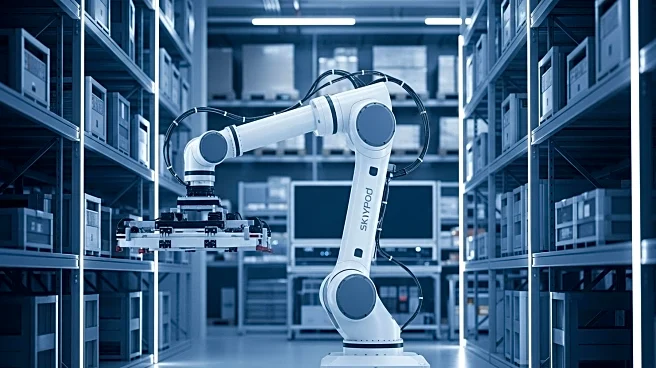What's Happening?
Exotec, a company specializing in warehouse automation, has partnered with ILS Logistics to implement its Skypod robotic systems across 12 sites in central and eastern Europe. This collaboration involves Polish integrator A1 Sorter and aims to enhance logistics operations in countries such as Poland, Slovakia, Hungary, Romania, Ukraine, and the Czech Republic. The Skypod system, known for its modular design and scalability, is expected to increase warehouse throughput significantly. The initiative is part of ILS's growth strategy, supported by its parent company, Inter Cars, to expand market share and improve logistics efficiency.
Why It's Important?
The deployment of Exotec's Skypod system represents a significant advancement in warehouse automation, potentially transforming logistics operations in Eastern Europe. By increasing efficiency and scalability, the system can help companies like ILS Logistics meet growing demand and improve service delivery. This move also highlights the increasing adoption of robotics in logistics, which can lead to reduced operational costs and enhanced competitiveness. As more companies embrace automation, the logistics industry may see shifts in employment patterns, with a focus on technical skills and system management.
What's Next?
ILS Logistics plans to continue implementing the Skypod system across its portfolio throughout 2026, with additional warehouse construction in Poland. The company aims to leverage this technology to address logistical challenges and support its ambitious growth plans. As the system becomes operational, stakeholders will likely monitor its impact on efficiency and market share. The success of this initiative could encourage other logistics firms to adopt similar technologies, further driving innovation in the industry.
Beyond the Headlines
The integration of advanced robotics in logistics raises questions about the future of employment in the sector. While automation can improve efficiency, it may also lead to changes in workforce requirements, emphasizing technical skills and system management. Additionally, the environmental impact of increased automation, such as energy consumption and resource use, may become a topic of discussion as companies strive for sustainable operations.








